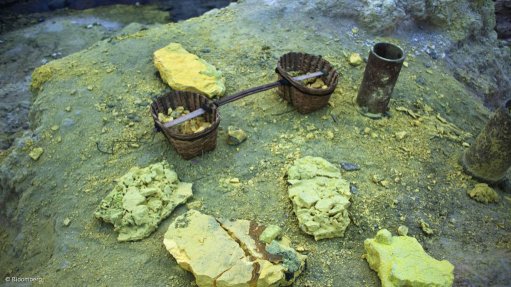
Photo by: Bloomberg
TORONTO (miningweekly.com) – In the wake of recently lifting rare earths export quotas, China, the world’s largest producer of the specialty metals, is still expected to manipulate the global market through other means, favouring instead preferential treatment of domestic producers as it strives to create an economy based on value-added products rather than raw materials exports.
Market-focused research house Benchmark Mineral Intelligence on Friday explained that after the World Trade Organisation (WTO) early last year took China to task on several counts of export restrictions on rare earths, tungsten and molybdenum, it had lifted a long-standing quota that capped tonnages of exports.
The WTO complaint was originally raised in 2012 by the US and later saw the European Union, Japan and Canada join the case, claiming that China was deliberately conducting unfair business practices by restricting the irreplaceable elements to global competitors.
China, which produces about 85% of the global rare earths output, capped rare earths export volumes from as high as 50 145 t in 2009 to 30 611 t in 2014.
The rare earths industry was in a state of consolidation after a Chinese export clampdown prompted a rapid spike in prices in 2010/11. However, the global economic crisis and a flood of new supplies resulted in the subsequent collapse of prices in 2013. Prices had now stabilised and were expected to remain so in the long term.
Benchmark analyst Simon Moores believed that despite China axing the quotas, the global rare earths market dynamics would not fundamentally change and that China’s preferential treatment of domestic producers would continue by other means.
“We expect China to refocus its efforts on restructuring the way it issues export licences to its producers and on simplifying its rare earths tax system.
“Without a licence, companies are banned from exporting. Beijing still controls this vital bottleneck of the supply chain, therefore, whether it caps exports at the port or controls the number of export licences issued, the result is the same; restricted supply of rare earths to the rest of the world,” Moores commented in a statement.
He pointed out that China had achieved this in several other critical mineral industries in the past and, while rare earths was the most extreme of all, the principle was no different in the eyes of the country's governing bodies.
Further, there was speculation about whether Western joint venture (JV) companies would be allocated export licences.
Moores noted that the move also offered China a chance to simplify its rare earths tax.
“It will be of great interest to the industry to see what the new taxation will look like and whether it will be different for 100% Chinese-owned operations and international JVs,” he said, adding that these factors would create short-term market uncertainty as the industry waited to see how it played out.
“In the long term, China’s stance of redirection of rare earths towards domestic consumption is likely to remain the same and consistent with its plan to create an economy based on value-added products and not raw materials.”